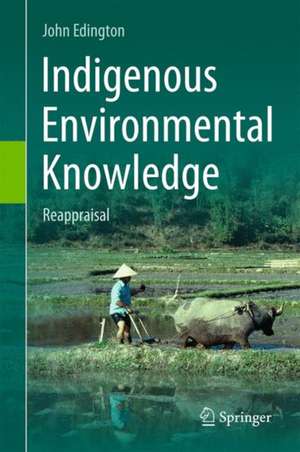Indigenous Environmental Knowledge: Reappraisal
Autor John Edingtonen Limba Engleză Hardback – 15 sep 2017
| Toate formatele și edițiile | Preț | Express |
|---|---|---|
| Paperback (1) | 630.98 lei 38-44 zile | |
| Springer International Publishing – 18 aug 2018 | 630.98 lei 38-44 zile | |
| Hardback (1) | 1113.09 lei 6-8 săpt. | |
| Springer International Publishing – 15 sep 2017 | 1113.09 lei 6-8 săpt. |
Preț: 1113.09 lei
Preț vechi: 1357.43 lei
-18% Nou
Puncte Express: 1670
Preț estimativ în valută:
213.01€ • 231.30$ • 178.93£
213.01€ • 231.30$ • 178.93£
Carte tipărită la comandă
Livrare economică 23 aprilie-07 mai
Preluare comenzi: 021 569.72.76
Specificații
ISBN-13: 9783319624907
ISBN-10: 3319624903
Pagini: 263
Ilustrații: XV, 263 p. 100 illus.
Dimensiuni: 155 x 235 mm
Greutate: 0.57 kg
Ediția:1st ed. 2017
Editura: Springer International Publishing
Colecția Springer
Locul publicării:Cham, Switzerland
ISBN-10: 3319624903
Pagini: 263
Ilustrații: XV, 263 p. 100 illus.
Dimensiuni: 155 x 235 mm
Greutate: 0.57 kg
Ediția:1st ed. 2017
Editura: Springer International Publishing
Colecția Springer
Locul publicării:Cham, Switzerland
Cuprins
1. PREFACE.- 2. FARMING.- Origins.-Responding to site and soil variations.- Coping with seasonal variations.- Maintaining soil fertility.- Coping with weeds and pests.- Cultural and religious for change.- 3. FOOD SUPPLIES AND NUTRITION.- Traditional diets.- Insights from nutritional science.- Input patterns for different classes of nutrients.- Starvation and malnutrition The paradoxical efficacy of traditional diets.- 4. HOUSE DESIGN AND CONSTRUCTION.- Design criteria.- The humid tropics.- The tropical highlands.- The desert fringe.- The temperate zone.- Pressures for change.- A future for traditional designs?- 5. FUEL SUPPLIES.- Traditional wood harvesting.- Disruptive influences.- Alternative energy sources.- Better ways of burning wood.- Rehabilitating forests.- Overall sustainability of firewood production systems.- 6. HERBAL MEDICINE.- Mixed expectations.- Patterns of village use.- Residual difficulties.- Remedial strategies.- 7. WATER SUPPLY AND WASTE DISPOSAL.- Water use.- Water quality issues.- Other water and waste related hazards.- Remedial strategies.- 8. PROSPECTS FOR VILLGE DEVELOPMENT.- Quality of life shortfalls.- External factors.- Influences arising from within communities.- Constructive interventions.- Augmenting incomes.- Comprehensive development plans.- 9. LESSONS FOR THE WORLD AT LARGE.- Contemporary issues.- Energy economies in agriculture and food distribution.- Energy economies in architecture and household management.- Protecting crop diversity.- Lessons from traditional medicine.- Improving dietary balance.- Attitudes to wild species.- REFERENCES.
Textul de pe ultima copertă
This book examines comprehensively for the first time, the scope and accuracy of indigenous environmental knowledge. It shows that in some spheres, including agriculture, house design, fuel and water manipulation, the high reputation of local observers is well deserved and often sufficiently insightful to warrant wider imitation. However it also reveals that in certain matters, notably some aspects of health care and wild-species population management, local knowledge systems are conspicuously unsound. Not all the difficulties are of the communities own making, some stem from external factors outside their control. However in either case, remedial measures can be suggested and this book describes, especially for the benefit of practitioners, what steps might be taken in rural communities to improve the quality of life. The possibility of useful transfers of information from local settings to Western ones is not ignored and forms the subject of the book’s final chapter. >
Caracteristici
Comprehensive – it covers all aspects of indigenous environmental knowledge Authoritative – it reflects the authors first- hand experience in over 15 developing countries Clearly written and well illustrated
